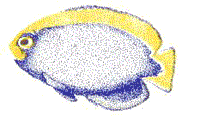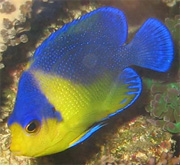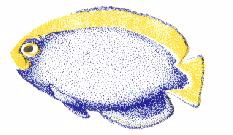|
FISH ON THE BRINK
By Jim Wolf, Marine Biologist
All of the rivers of the world ultimately contribute their water to
the sea. In this region there are extremes of salinity, temperature, and
biological tolerance. Fish that live in this zone are called "brackish"
to reflect their tolerance of a wide range of salinity's.
Many faimiles if fishes episodically inhabit this region. Sharks
are occasionally found up to 1000 miles up the Mississippi River, and many
fresh water fishes can be seen miles out to sea. These are the exception.
There are many families of fishes in a fish store, but five families are
recognized as be truly brackish, with many other families tolerant of the
varying salt concentration. The changing biological conditions of the brackish
environment require a frequent feedings too fuel the fihes high metabolism.
So lets look at four of these voracious families!
FAMILY MONODACTYLIDAE. The Monos come from the coast of Africa
and Indo Pacific. They are extremely fast predators that thrive on
a diet of worms, shrimp, and other high portion foods. They will only bother
fish and inverts that they can eat, and may act aggressive to smaller kin.
If the salinity is too low they are prone to "Ich" so avoid pure fresh
water. As with the other families, at least 1 tablespoon of non iodinized
salt for every 5 gallons is an absolute minimum.
FAMILY TOXOTIDAE. The are four species of Archer fishes. Spitting
at small insects that live up to 3 feet above the water line, they can
actually dislodge a tasty morsel! Greedily consumed are small insects placed
at the water's surface, however they will adapt to a variety of prepared
food. Insure that their food floats, as the are poorly equipped to feed
on food that is not on the surface. There eyes can accommodate for the
refraction of light through the air water interface. After adjuting to
the aquarium they will actively spit at a small "fake bug" hung over an
open aquarium if this spitting is followed by feeding!
FAMILY EPHIPPIDIDAE. The spadefish and batfish include over 14
species, and most are very hardy with the exception of the Pinnatus Bat
(Platax pinnatus). They will eat almost anything, and grow quickly. You
should look closely for signs of aggression and note that they are especially
prone to "Ich". Larger specimens may scratch themselves on coral, so keep
the tank spacious and the decoration sparse. A finicky feeder can be tempted
with live brine shrimp and try to insure that they can eat their fill.
FAMILY SCATOPHAGIDAE. The three species of Scats belong to a
family of fishes that literally translated means "dung eaters". So it is
obvious that they will eat anything, and lots of it! Their dorsal
spine is mildly venomous, so watch out. They have extremely high metabolisms,
so the old adage " a fat scat is a healthy scat" really applies.
Scathophagus argus is actually both the Green and Ruby Scat and it occurs
in two color varieties. They can be a bit nippy so watch out for signs
of aggression towards timid cohabitants.
Brackish water in a nutshell means a high metabolism. Insure a ample
diet and compatible
tankmates and a clean aqaurium and these will thrive. A little
bit of care and food goes a long way!
|











